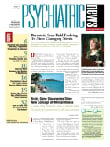There's no doubt that bipolar disorder is a highly heritable and complex genetic trait, but the underlying basis for its inheritance remains elusive. John Piletz, Ph.D., an adjunct professor of psychiatry at Loyola University of Chicago Stritch School of Medicine and cofounder of HarborWay Clinical in Pascagoula, Miss., and colleagues have recently created an online database of genetic studies of bipolar disorder in an unfunded effort to fuel the search for that method of inheritance.
"The idea for the database arose during a transition time in my career when I decided to abandon molecular biology and cell-signaling research approaches, with which my laboratory had worked for years. It seemed we were just looking at so many trees in the forest," said Piletz.
Piletz and his colleagues believe the database may be the first complete collection of all published gene-specific linkage and association findings on bipolar disorder, including unbiased empirical scans of the human genome (genomewide association studies).
In an article in the April Psychiatric Genetics, the group described the construction and preliminary analysis of the database and discussed "the most robust and best replicated gene findings to date."
Articles considered for the database were required to mention specific numbers of patients with bipolar disorder. All studies had to contain both genotypic and phenotypic information, and that data had to be genic (naming genes rather than just loci). A master list of 574 studies was initially compiled as the basis for establishing the database, then it was subjected to specific rules regarding the methods for lifting data from them. For this purpose, Piletz and his colleagues created a list of a priori rules of data selection, devised to make the database as bias-free as possible. The information was uploaded for management as a MySQL database. Some of the gene names are different from the ones in the original studies because they were standardized to Human Genome Organization gene names for the database.
"The main motivation behind our database lies in the hope that if weak gene findings can be viewed together, they might guide future studies," said the researchers.
Interestingly, Piletz and colleagues believe the contents of the database highlight the "nagging likelihood" that the diagnosis of bipolar disorder might not itself be an entirely suitable phenotype to study, citing the existence of two recognized subtypes of the disorder (BD1 and BD2), both of which run together in pedigrees, and the fact that major depressive disorder, schizoaffective disorder, and schizophrenia are represented in most families of bipolar disorder probands. "Bipolar disorder may be best considered as a spectrum disorder," they said.

